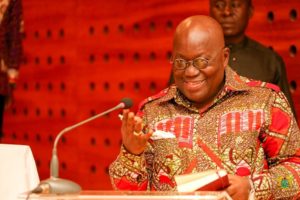Speaking at the National Anti-Corruption Conference on Friday, 10 December 2021, President Akufo-Addo said the Office of the Attorney General and the Economic and Organised Crime Office (EOCO), in addition to the countless cases being prosecuted around the country, have successfully prosecuted a number of high-profile cases, including a case of stealing in the Republic vs. Eugene Baffoe-Bonnie & Others.
“Many other high-profile prosecutions involving corruption, economic crime, fraud, procurement breaches and money laundering, like the Republic vs. Alhaji Collins Dauda & 4 Others in the Saglemi Scandal; Republic vs. Ernest Thompson & Others; Republic vs. Dr Kwabena Duffuor & Others; Republic vs. Stephen Opuni & Others, are ongoing. It is worthy to note that these cases have, as their sole object, the principle of holding public officers to account, and involve sums in excess of US$850 million and GH¢2 billion,” he added.
The President also said the Attorney General, on behalf of the government, is currently leading the effort to enact a law on the conduct of public officers.
He said, “inasmuch as public officials are required to declare their assets upon taking office as a tool of fighting corruption, I am, however, of the candid opinion that existing legislation on corruption, relating to the conduct of public officers in Ghana, appears to be inadequate to deal extensively with public office accountability.”
According to the president, “the need to lay down a set of far-reaching and a more fit for purpose set of regulations for the conduct of public officers, which will give effect to the provisions of Chapter 24 of the Constitution on the conduct of public officers, is, in my view, now self-evident.”
To this end, he revealed that the Attorney General, over the past four months, has undertaken various stakeholder consultations with a number of public sector organisations, civil society and other interest groups to this end.
When passed into law, President Akufo-Addo indicated that the Conduct of Public Officers Act will follow the example of legislation in other jurisdictions like the United States Ethics in Government Act of 1978, Public Officers Ethics Act of Kenya, and the U.K. Constitutional and Governance Act of 2010, in addressing issues regarding financial portfolios held by public officers before assuming public office, links to family business, improper enrichment, care of public property, professional practices, property, investments/shareholdings and other assets, self-dealing, partiality in the performance of duties, use of public or confidential information to further private interest, amongst others.
“The Bill provides a gamut of stringent administrative measures and sanctions to deal with violations of the law, ranging from a bar against holding public office for limited and indefinite periods to penal measures. The Bill also seeks to strengthen the role of CHRAJ in the investigation of allegations of contravention of or non-compliance with the Code of Conduct for Public Officers, including conflict of interest, non-declaration of assets, and illicit enrichment,” the President added.
Updating the Conference about some of the important contributions of the Office of Attorney General in the detection and prosecution of high-profile corruption cases, as well as in the protection of the public purse, the President acknowledged that the state’s tight purse is very much affected by the award of judgment debts, in various unconscionable transactions.
“The recent example of a financial house claiming payment of interest of some GH¢1.3 billion after 11 years, from a transaction involving a meagre GH¢268,000 in 2008, even after the state had already paid some GH¢79 million, comes to mind.
“Through the effort of the Attorney General, the Supreme Court declared further payment as unlawful, saving the State some two hundred and thirty million dollars (US$230 million),” he said.
He also told the gathering about how, on 31 July 2021, the Attorney General succeeded in setting aside a judgement debt in excess of US$15.3 million imposed by the High Court, Kumasi, in an action arising out of the activities of the erstwhile Inter-Ministerial Committee on Illegal Mining about two years ago.
 Home Of Ghana News Ghana News, Entertainment And More
Home Of Ghana News Ghana News, Entertainment And More





